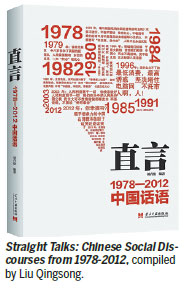A history of change in the words of those who lived it
For readers like Zhang Qin, born in the 1990s, it's news that in 1978 there was a movement against flared trousers.
Teachers would then catch the offenders and cut off the "extra" cloth in an effort to keep the young away from "bourgeois corruption", symbolized by such "weird" fashion.
And till March that year, quotes by Karl Marx, Friedrich Engels, Vladimir Lenin, and Mao Zedong had to be printed in bold while published in newspapers.
It was Deng Xiaoping who put a stop to the practice.
"I know how dramatic the changes were in 1978, the start of the reforms and the opening up, but there were so many details about our recent history that I did not know," says Zhang.
Zhang's comments were in relation to a 346-page book, Straight Talks: Chinese Social Discourses from 1978-2012, which has grabbed her attention.
She says she was also touched by the brief stories of the common people as their fate changes and turns with the bigger historical torrents, alongside the bigger names' remarks and decisions.
The book also contains a story of how film director Zhang Yimou gained access to university after three years of farm work and seven years of factory labor, when entrance exams for universities were resumed.
It also tells how perplexed then 19-year-old Zhang Huamei, from Wenzhou, Zhejiang province, was when she got the news that she would receive the country's first certificate to run a private business in December 1980.
Zhang, the book says, was reluctant to take the piece of paper home, since she worried that she would be punished in the future for stepping into the realm of a market economy.
But her father, the book adds, said to her, the country is determined to reform, so go ahead.
Focusing on such incidents in Chinese society over the past 34 years, the book quotes from remarks, articles and comments recorded in the news media and other material.
The book, an updated second edition of a 2009 release, was launched last month by Contemporary China Publishing House.
Beijing-based Liu Qingsong, 41, tells China Daily that he decided to compile the book in 2008 after realizing that his younger friends had very limited knowledge about the road China had taken, "because what they now see is so different from just decades ago, what they have now is so much better".
Liu, born in Wanzhou in southwestern Chongqing, says he remembers a time when the neighbor's two daughters shared one pair of decent trousers, so when market day came, only one had the chance to go out and enjoy the fair.
With the country becoming the world's second-largest economy, Liu would like readers to see how society has gradually opened up, and "how every individual has gone from not knowing to knowing and from having limited choices to being spoilt for choice".
"It (the book) is also a history of progress and of struggles," he adds.
So, in the book he mixes up people's experiences with the important footsteps the country took as he lists thousands of quotes in chronological order, each under a short, concise and humorous introduction on the historical context.
Yu Zhixiao, a literary critic, says: "The way the writer introduces and lists the material, without any comments, is smart and maybe the best way to present this history."
Reader Qingyang Yuer says on Douban.com that the book is also good material for the study of contemporary language and society.
Liu says he has been collecting press material for 15 years, especially first issues and final issues of publications, and he has used a lot of this in his book.
Liu studied the law in college and became a journalist at a local newspaper in Chongqing. He then moved to Beijing to pursue a career in nonfiction.
"I see a natural call for writing and I feel happy if I can capture and record even a segment of what's going on around us," Liu says.
meijia@chinadaily.com.cn



















